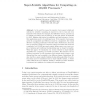Free Online Productivity Tools
i2Speak
i2Symbol
i2OCR
iTex2Img
iWeb2Print
iWeb2Shot
i2Type
iPdf2Split
iPdf2Merge
i2Bopomofo
i2Arabic
i2Style
i2Image
i2PDF
iLatex2Rtf
Sci2ools
ICCS
2005
Springer
2005
Springer
Super-Scalable Algorithms for Computing on 100, 000 Processors
In the next five years, the number of processors in high-end systems for scientific computing is expected to rise to tens and even hundreds of thousands. For example, the IBM Blue Gene/L can have up to 128,000 processors and the delivery of the first system is scheduled for 2005. Existing deficiencies in scalability and fault-tolerance of scientific applications need to be addressed soon. If the number of processors grows by a magnitude and efficiency drops by a magnitude, the overall effective computing performance stays the same. Furthermore, the mean time to interrupt of high-end computer systems decreases with scale and complexity. In a 100,000-processor system, failures may occur every couple of minutes and traditional checkpointing may no longer be feasible. With this paper, we summarize our recent research in super-scalable algorithms for computing on 100,000 processors. We introduce the algorithm properties of scale invariance and natural fault tolerance, and discuss how ...
Related Content
| Added | 27 Jun 2010 |
| Updated | 27 Jun 2010 |
| Type | Conference |
| Year | 2005 |
| Where | ICCS |
| Authors | Christian Engelmann, Al Geist |
Comments (0)

